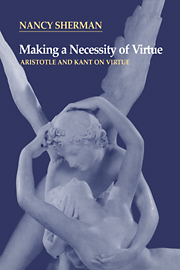Book contents
- Frontmatter
- Contents
- Preface and Acknowledgments
- Abbreviations and Notes on Translations
- Chapter 1 A New Dialogue
- Chapter 2 The Emotional Structure of Aristotelian Virtue
- Chapter 3 A Brief Stoic Interlude
- Chapter 4 The Passional Underpinnings of Kantian Virtue
- Chapter 5 The Shared Voyage
- Chapter 6 Aristotelian Particularism
- Chapter 7 Making Room for Practical Wisdom in Kantian Ethics
- Chapter 8 Perfecting Kantian Virtue: Discretionary Latitude and Superlative Virtue
- Bibliography
- Index
Chapter 2 - The Emotional Structure of Aristotelian Virtue
Published online by Cambridge University Press: 18 December 2009
- Frontmatter
- Contents
- Preface and Acknowledgments
- Abbreviations and Notes on Translations
- Chapter 1 A New Dialogue
- Chapter 2 The Emotional Structure of Aristotelian Virtue
- Chapter 3 A Brief Stoic Interlude
- Chapter 4 The Passional Underpinnings of Kantian Virtue
- Chapter 5 The Shared Voyage
- Chapter 6 Aristotelian Particularism
- Chapter 7 Making Room for Practical Wisdom in Kantian Ethics
- Chapter 8 Perfecting Kantian Virtue: Discretionary Latitude and Superlative Virtue
- Bibliography
- Index
Summary
OPENING A DIALOGUE ON THE EMOTIONS
In this chapter I, set the stage for a dialogue between Aristotle and Kant on the subject of the emotions and their place in morality. On a traditional reading of both authors, the contrast is drawn along the following lines: On an Aristotelian account, virtue is expressed not merely in fine action but in fine emotions as well; both action and emotion are morally praiseworthy aspects of character. Kantian theory, in contrast, locates moral merit narrowly in dutymotivated action, with emotions or feelings often viewed as detracting from, or at least not adding to, what is morally meritorious. I adhere to the general lines of this Aristotelian sketch, while breaking from the Kantian one. In place of the traditional Kantian account, I argue for the importance of a composite conception of virtue which includes cultivated emotions that support moral interest. This interpretation pays heed to the grounding of morality in practical reason, and to the interface of practical reason with our affective natures. That is, I take seriously the Kantian moral project as a project both in the metaphysics of morality and in moral anthropology – in the grounding of morality and in the application of morality to the specific conditions of human nature, including our emotional natures. We shall come to this in Chapter 4. For now, the focus will be principally on Aristotelian virtue.
- Type
- Chapter
- Information
- Making a Necessity of VirtueAristotle and Kant on Virtue, pp. 24 - 98Publisher: Cambridge University PressPrint publication year: 1997



